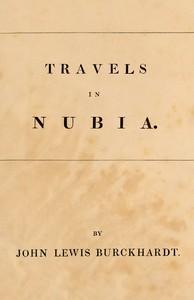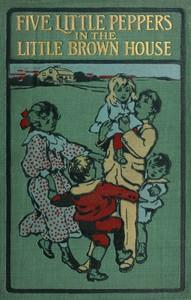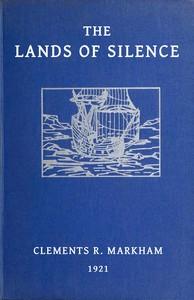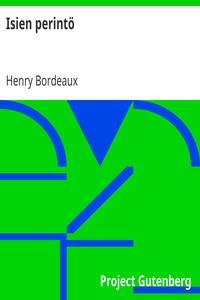|
|
Read this ebook for free! No credit card needed, absolutely nothing to pay.Words: 247354 in 44 pages
This is an ebook sharing website. You can read the uploaded ebooks for free here. No credit cards needed, nothing to pay. If you want to own a digital copy of the ebook, or want to read offline with your favorite ebook-reader, then you can choose to buy and download the ebook.

: Travels in Nubia by Burckhardt John Lewis Association For Promoting The Discovery Of The Interior Parts Of Africa - Nubia Description and travel; Nile River Valley Description and travel; Burckhardt John Lewis 1784-1817@FreeBooksFri 22 Sep, 2023 ERRATA. MEMOIR ON THE LIFE AND TRAVELS OF JOHN LEWIS BURCKHARDT. MEMOIR, &c. John Lewis Burckhardt was of an eminent family of Basle, but born at Lausanne. He was the eighth child of John Rodolph Burckhardt, commonly called Burckhardt of Kirshgarten from the name of his mansion in the city of Basle. Burckhardt of Kirshgarten began life with the best prospects, but they were soon blighted by the French revolution; from the very beginning of which he became involved in a series of dangers and difficulties, which at one time had nearly brought him to the scaffold. On the accusation of having been concerned in betraying the T?te-de-pont at Huningen to the Austrians, when they besieged that fortress in the year 1796-7, he was tried for his life by the French party at Basle; and although, in consequence of the undoubted proofs of his innocence brought forward upon his trial, he was released from prison, he found it impossible to remain in the power of the French, as he had certain information of his being upon the list of those who were to be destroyed either by open or secret means. He entered into a Swiss corps in English pay, but was under the necessity of leaving his wife and children at Basle, to save the family if possible from total ruin. Here his son Lewis Burckhardt was a daily witness of the misery suffered under the republican French, and here he imbibed, at a very early age, a detestation of their principles, and a resolution never to bend under their yoke. It was his wish to serve in the armies of some nation which should be at war with France; but he was first desirous of completing his education, which with the exception of two years in an establishment at Neuchatel, had been hitherto under the care of a person residing in his father's house. In the year 1800, being then 16 years of age, he was carried by his father, Colonel Burckhardt, to the university of Leipzig, from whence after a stay of near four years he was removed to G?ttingen. In both places his exemplary conduct and high feelings of honour, his distinguished talents and ardent zeal for knowledge, ensured him universal esteem and respect; while a remarkable frankness, cheerfulness, kindness, and evenness of temper, made him particularly beloved by his more intimate acquaintance. After leaving G?ttingen in 1805, he returned to his father, and remained also a short time with his mother at Basle. Uncertain what plan to pursue, unable to find upon the continent any nation which was not either subject to the French or in alliance with them, and having for these reasons rejected an offer made to him by one of the royal courts of Germany to enter the diplomatic line, he resolved at length upon proceeding to England, in the hope of meeting some opening to his wishes in the service of this country. He arrived in London in the month of July, 1806, bringing with him several excellent letters of introduction, among which was one to Sir Joseph Banks, from Professor Blumenbach of G?ttingen. The President of the Royal Society had long been an active member of the Committee of the African Association, which at that time had more than begun to despair of any further intelligence from Mr. Horneman, and in the following year received an account of the death of another of their travellers, Mr. Henry Nicholls, at Old Calabar, in the bight of Benin, where he was preparing himself for an expedition into the interior country. The result of the information obtained by the travellers of the Association on the Western side of Africa, compared with that transmitted by Mr. Horneman from the North, had now rendered it advisable to make a new attempt in the latter direction. These wishes of the Association soon became known to Burckhardt, through his acquaintance with some of the leading members. To a mind equally characterised by courage, a love of science and a spirit of enterprise, such an undertaking afforded peculiar attractions, and accordingly it was not long before Burckhardt made an offer of his services to Sir Joseph Banks and the Rev. Dr. Hamilton. The latter, who was at that time Treasurer and acting Secretary of the Association, perceiving him to be undismayed by the strong representations of danger, which it was peculiarly right to make to a person of his birth and education, and having found him admirably adapted to the undertaking by his natural and acquired talents, as well as by the vigour of his constitution, laid his offer before the Association at the next general meeting in May, 1808. The offer was willingly accepted, and Burckhardt received his instructions on the 25th of January, 1809, having diligently employed the interval in London and Cambridge in the study of the Arabic language, and of those branches of science which were most necessary in the situation wherein he was about to be placed. He allowed his beard to grow and assumed the Oriental dress: he attended lectures on chemistry, astronomy, mineralogy, medicine and surgery, and in the intervals of his studies he exercised himself by long journeys on foot, bareheaded, in the heat of the sun, sleeping upon the ground, and living upon vegetables and water. As an intimate knowledge of Arabic was the most important of all acquirements, our traveller was instructed to proceed in the first instance to Syria, where at the same time that he studied the language in one of its purest schools, he might acquire a habitude of Oriental manners at a distance from those countries which were to be the scene of his researches, and consequently without much risque of being afterwards recognised. After a stay of two years in Syria, he was instructed to proceed to Cairo, from whence, accompanying the Fezzan caravan to Mourzouk by the same route traversed by Horneman, he was directed to make that town the point of his departure for the interior countries. On the 2d of March, 1809, Burckhardt sailed from Cowes on board of a merchant ship, proceeding with convoy to the Mediterranean, and he arrived at Malta in the middle of April, from whence he addressed two letters to Sir Joseph Banks, of which the following are extracts: You will be much interested in hearing that at this moment an attempt is making to explore the Interior of Africa; and that I have, unknowingly, entered upon my expedition as rival to a gentleman who is probably by this time in the scene of action. I was allowed the perusal of a letter from Dr. Seetzen to Mr. Barker, who is a merchant of Malta, and brother to the British Consul at Aleppo. Dr. Seetzen is a German physician, who was sent five or six years ago by the Duke of Saxe-Gotha into the Levant, to collect manuscripts and Eastern curiosities. He has resided for a considerable length of time at Constantinople, at Smyrna, at Aleppo, at Damascus, and for the last eighteen months at Cairo, from whence his letter to Mr. Barker is dated on the 9th of February last. After remarking that he had sent off from Cairo to Gotha a collection of fifteen hundred manuscripts and three thousand different objects of antiquity, he informs Mr. Barker that he is waiting for the next caravan to set out for Suez; that he means to go down the eastern coast of the Red Sea, and then entering Africa to the southward of the line, to explore its interior parts. Such are his expressions. The late Bey of Tripoli is at present a fugitive at Malta: he is a much respected old man; his name Akhmed Karamaly: five or six years ago he was dispossessed of his throne by his brother, the present reigning Bey. I take Akhmed to be the Bey mentioned in Horneman's letters. He has at length come to a compromise with his brother, who has ceded to him the province of Derna, and promises not to molest him there, provided he keeps quiet himself; and Akhmed is now going to take possession of his new territory. I had never heard before that Derna was a dependency of Tripoli; the country was generally, I think, supposed to be inhabited by free tribes of Arabs. It is much to be regretted that the whole extent of that coast, from Mesurata to Derna, and almost as far as Alexandria, should still remain unsurveyed; no accurate soundings have been taken along the shore, and its inland parts, even those nearest the sea, are totally unknown. I am assured that there are three safe anchoring places between Derna and Alexandria; the harbour of Bomba, formed by an island lying across the bay, is particularly spoken of as able to contain almost any number of ships and of any size. When the French fleet, under Admiral Gantheaume victualled Corfu last year, and escaped the vigilance of Lord Collingwood's cruising squadrons, they were hid for some time, with their fore and top masts struck, behind the island of Bomba, and were passed unnoticed. The Malta pilots are perfectly well acquainted with all the inlets of the coast, but their intelligence is little to be depended upon, because the safety of many of their privateers depends upon an exclusive knowledge of that part of the Mediterranean. An English traveller might, under the protection of the governor of Malta, and of the new sovereign of Derna, who is said to be very much attached to this country, visit with great personal safety, the ancient site of Berenice, Cyrene, and the gardens of the Hesperides. Some account of the recent eruption of Mount AEtna has probably already reached you; until you receive a detailed description of it, even such a superficial account as I have received from different quarters may perhaps prove acceptable to you. It was from the letter of an English gentleman who was on the spot, that I obtained the following account. Free books android app tbrJar TBR JAR Read Free books online gutenberg More posts by @FreeBooks
: Five little Peppers in the Little Brown House by Sidney Margaret Heyer Hermann Illustrator - Siblings Juvenile fiction; Families Juvenile fiction; Fatherless families Juvenile fiction; Five Little Peppers (Fictitious characters) Juvenile fiction@FreeBooksFri 22 Sep, 2023

: The lands of silence by Markham Clements R Clements Robert Sir Guillemard F H H Francis Henry Hill Editor - Polar regions Discovery and exploration@FreeBooksFri 22 Sep, 2023
|
Terms of Use Stock Market News! © gutenberg.org.in2025 All Rights reserved.






